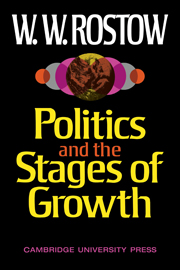Book contents
- Frontmatter
- Contents
- Tables
- PREFACE
- INTRODUCTION
- 1 A way of looking at politics
- 2 Politics in pre-Newtonian societies
- 3 The politics of the preconditions for take-off
- 4 The politics of the take-off and the drive to technological maturity
- 5 American politics: a not so special case
- 6 The politics of the search for quality
- 7 Politics and democracy in the contemporary developing world
- 8 War and peace in the global community
- APPENDIX: The views of others in relation to the approach taken here
- NOTES
- INDEX
3 - The politics of the preconditions for take-off
Published online by Cambridge University Press: 16 October 2009
- Frontmatter
- Contents
- Tables
- PREFACE
- INTRODUCTION
- 1 A way of looking at politics
- 2 Politics in pre-Newtonian societies
- 3 The politics of the preconditions for take-off
- 4 The politics of the take-off and the drive to technological maturity
- 5 American politics: a not so special case
- 6 The politics of the search for quality
- 7 Politics and democracy in the contemporary developing world
- 8 War and peace in the global community
- APPENDIX: The views of others in relation to the approach taken here
- NOTES
- INDEX
Summary
A GENERAL FRAMEWORK
Introduction
We consider here a period in the evolution of a society dated by an endpoint; that is, by the beginning of its first sustained phase of industrialization, the take-off. And we examine how interactions within the political system of security factors, economic forces, and constitutional changes related to the moment when the society began to absorb as a more or less regular matter the stock and flow of modern technology hitherto not applied systematically to its round of life.
This is, in effect, the period during which a traditional society becomes sufficiently modernized in all its dimensions to undertake the first serious, even if limited, phase of the enterprise which, more than any other, is the hallmark of modernity; that is, industrialization, including, of course, regular innovation in agriculture, transport, communication, and other services. We are considering, therefore, a complex as well as critical transitional process. It is, in effect, mainly this process to which the bulk of contemporary literature on the politics and sociology of non-Western societies has been addressed, as well as the ‘early modern’ history of Europe.
The Dating of the Preconditions: Short and Long Views
If the initiation of take-off is taken as the end-point, where do we begin?
There are two options. The first is to define the preconditions as a relatively short period of usually active public and/or private preparation, before industrialization first takes hold.
- Type
- Chapter
- Information
- Politics and the Stages of Growth , pp. 54 - 97Publisher: Cambridge University PressPrint publication year: 1971



